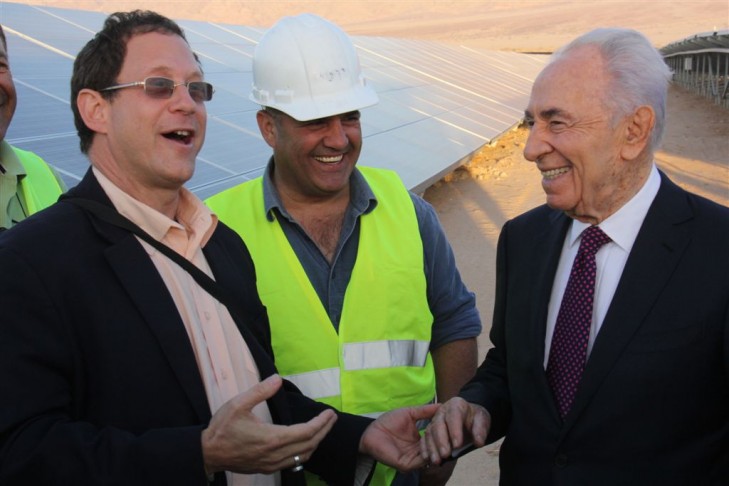“I am a creation of the Boston Jewish community,” observes Yosef Abramowitz. Abramowitz will be returning to his hometown on Wednesday, April 6, to deliver the Martin Kace Lecture at Hebrew College in Newton. The title of his talk, “An Israeli Vision for Fighting Climate Change,” not only reflects his passion for his work, but also conveys his idiosyncratic journey from Boston Jewish educator to Israeli solar impact investor.
Some might say that Abramowitz has a genius for reinventing himself. But he sees his latest venture as a continuation of an activism that began during his college years at Boston University. Modest about his impact on the Soviet Jewry movement in the 1980s—“I was privileged to be a nice footnote in its history”—Abramowitz headed the Union of Councils for Soviet Jewry, an umbrella activist group. “If you look at the Soviet Jewry movement dispassionately,” he says, “it may have been the greatest human rights story in civilization. Over a million people were freed without bloodshed.”
The spirit of that victory has stayed with Abramowitz throughout his subsequent endeavors. In the mid-1990s he founded a media company comprising prize-winning webzines under the rubric Jewish Family & Life! The exclamation point reflected Abramowitz’s exuberance for bringing Judaism to unaffiliated Jews and interfaith families. During that time, Abramowitz and his wife, Rabbi Susan Silverman, were also growing their own family. They adopted two sons, Adar and Zamir, from Ethiopia, and Ashira, their birth daughter, joined her two older sisters and brothers. It was an exhilarating time for Abramowitz, which he capped with a family move to Kibbutz Ketura in southern Israel in 2006.
“The move to Israel was about having time with my family,” Abramowitz says. “Zamir had just come home to us, and Susan and I were going to write books. We’d gel as a family. Susan initially insisted on being far away from Jerusalem. We wanted to experience the power of the desert, to detox and clear our brains.”
The quiet, reenergizing time that Silverman envisioned for her family was the beginning of another life-changing career for Abramowitz. “When we got out of the air-conditioned van at the end of the day on August 24, 2006, we opened the door and were assaulted by this unbelievable heat,” Abramowitz remembers. “The sun was about to set, yet there were these laser beams of heat burning us to a crisp in the third most extreme desert in the world.” Abramowitz was shocked that the kibbutz, and in fact most of Israel, had not already harnessed the natural power of the sun.
What seemed obvious to Abramowitz was met with skepticism by his new Israeli neighbors. “Israelis saw me as this naïve American kibbutznik coming up against Israeli politics and bureaucracy,” he says. “They told me I’d never win. As soon as you say, ‘You’ll never win,’ to an old Soviet Jewry activist, it triggers that idealistic gland buried deep within the psyche. I said to myself that if we can get a Hebrew teacher out of solitary confinement in Siberia, we can change a couple of laws in our country.” Despite the governmental obstacles that Abramowitz encountered, his natural optimism kept him focused and buoyed.
Kibbutz Ketura was not the first home Abramowitz made in Israel. In 1969 he came to the country with his parents and brother, but returned to America in 1972 so his father could complete his graduate studies. The family was certain they would return, but Abramowitz did not go back to live in Israel until he finished college. During that time he served in the army before eventually returning again to the United States.
He notes that all the pieces from his past fell together on that late August day when he and his family arrived at Ketura. Within the first week of his time on the kibbutz, he and two partners, Ed Hofland and David Rosenblatt, formed the Arava Power Company. “Susan really wanted to chill, and she gave me six months, maximum, to do solar work,” he says. “But within 10 days of our arrival the country released new solar energy regulations, and I was knocking on every government door. I soon realized that I had to build Israel’s solar industry from the local council all the way to the prime minister’s office. That meant I would have to wage hundreds of regulatory and statutory battles.”
The family now lives in Jerusalem, where Abramowitz is president of Energiya Global—the global successor to Arava Power. In 2011, Abramowitz and his partners built the first solar field in Israel. The endeavor attracted worldwide attention, particularly from developing countries, which asked for help in creating their own solar fields. That was the beginning of Abramowitz’s latest ventures in East Africa, where Energiya Global has helped to build solar fields in Rwanda and Burundi.
As for his upcoming appearance at Hebrew College, Abramowitz says, “People are hungry for good news coming out of Israel, and I’m thrilled to come back to deliver it.”
Yosef Abramowitz will deliver the Martin Kace Lecture at Hebrew College on Wednesday, April 6. Click here for ticket information.
This post has been contributed by a third party. The opinions, facts and any media content are presented solely by the author, and JewishBoston assumes no responsibility for them. Want to add your voice to the conversation? Publish your own post here. MORE



